'In Dirt Music, remembering the time before a car crash took the lives of his brother Darkie, Darkie's wife Sal, and their two children, Bird and Bullet, Luther Fox recalls Bird's question : 'Lu, how come water lets you through it?' Bird is the one who saw God, and 'if anyone saw God it would likely be her. Bird's the nearest thing to an angelic being.' Bird's question suggests the function of water in Winton's novels. Water is everywhere in his writing, as people sail on it, dive into it, live on the edge of it. Clearly the sea and the river are vital aspects of the writer's own experience. But water is more than an omnipresent feature of his writing and his life, the oceanscape of his stories. It is something that 'lets you through'. It lets you through because it is the passage to a different state of being, sometimes in dream, sometimes in physical extremity, but always offers itself as the medium of transformation. When it lets you through - whether to escape to a different life, as a rite of passage to adulthood, to see the world in a new way or to discover the holiness of the earth or the wonder of the world, whether it is the baptismal water of redemption to an opening to a world of silence - and it is all these things- you become different.' (Author's introduction 16)



